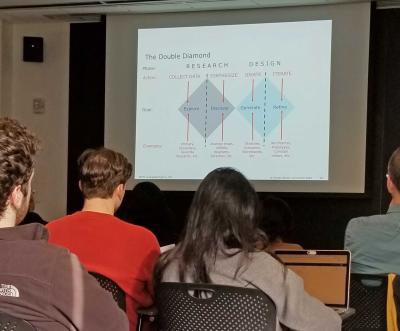Inviting Clients for Spring 2022 BHCI Capstone Projects

The Human-Computer Interaction Institute at Carnegie Mellon University is soliciting clients for its Spring 2022 Undergraduate Capstone Projects.
We are looking for clients who wish to collaborate with a team of strong, interdisciplinary CMU students on an open-ended problem for which a novel, innovative digital product or service might be a solution. We are looking for approximately 15 project clients for the spring semester of 2022. If selected, there will be no cost to the client.
If you are interested in working with us, please email Professor Vincent Aleven by close of business on Wednesday, November 24, 2021, and include the information requested in the "Next Steps" section below.
For more information about the undergraduate HCI Capsone project course, please see the full announcement below.
About the BHCI Undergraduate Capstone project:
For almost two decades, our talented undergraduate students in human-computer interaction (HCI) have partnered with industry, non-profits, museums, city departments, and academic researchers to create innovative technology that harmonizes with human goals. Through interdisciplinary research, design, computer science, and behavioral sciences, our students have improved the features of Resy (the popular reservation app), built the controls for a child-friendly robot, designed an interactive exhibit for the Carnegie Museum and built an application to help players on the Pittsburgh Steelers NFL team to learn their playbook. Other prototypes designed and built by our student teams include a video game to help orthopedic surgery patients with their rehab exercises and novel controls for a robotic arm for quadriplegics.
Overview:
Each spring semester, teams of 4 to 5 undergraduate seniors majoring in Human-Computer Interaction at Carnegie Mellon complete a semester-long project for an internal or external client. Under supervision from faculty and industry advisors, students perform user-centered research, brainstorm new ideas for novel concepts, build prototypes, and perform user testing. The final deliverable to the client is a polished prototype with documentation about the process, including research, design development, code, etc. Clients sometimes turn their prototypes into fully functional products, or hire students from their project team after they graduate. The course instructors provide guidance during weekly meetings with the project teams.
Project Requirements:
Projects begin in mid January 2022 and finish in early May. The best projects for students and clients balance flexibility and structure, meaning that they are somewhat open-ended with room for research discoveries and design exploration, but with enough constraints that a limited-scope, semester-long project can be “carved out” after initial explorations. Projects can be based on an existing product, but do not have to be. Because the course has rigorous deadlines and deliverables, projects cannot be tied to the client organization's production schedule or to the client’s preferred processes. Clients are required to commit at least one person to the role of providing weekly contact with their student team, as well as giving access to materials, software, and feedback as needed. Clients are also responsible for helping the project team gain access to users (for testing) and other stakeholders (as needed) over the course of the project. All clients will be asked to sign an intellectual property agreement.
Cost:
There is no cost to the client.
Next Steps:
If you have a project that could benefit from the expertise of our students, please let us know by emailing Professor Vincent Aleven by close of business on Wednesday, November 24, 2021. Be sure to include the contact information of your intended client liaison, as well as a short (1-3 paragraphs) description of your project. In your project description, please explain how you would help the project team gain access to users and, if appropriate, other important stakeholders.
We will invite up to 18 potential clients to give a very short virtual presentation to the students, most likely on a Friday in December, 2021. Potential clients who cannot attend the virtual session will be able to submit a video presentation, although live (virtual) participation has the advantage that students can get their questions answered right away.
Each student will then rank the projects according to their preferences. Based on their votes, projects will be selected and student teams formed prior to the holiday break. Decisions will be announced December 22 at the latest. Clients will be invited to join the first day of class (January 19). All student teams will set up a kick-off meeting with their client during that same week.
Contact us:
For more information, please contact Vincent Aleven (aleven@cs.cmu.edu), Professor of Human-Computer Interaction and Director of Undergraduate Programs.

